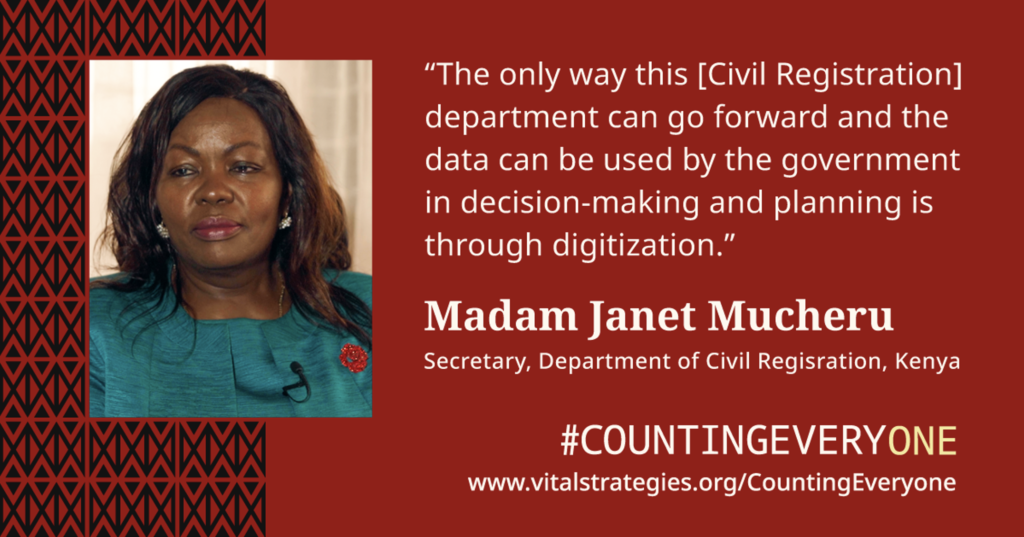
When Madam Janet Mucheru assumed her role heading Kenya’s Department of Civil Registration in 2017, only 61% of the country’s births were registered, and even fewer deaths. But in the past five years, Kenya has made great progress. These achievements are now highlighted as the latest feature in #CountingEveryone, a global campaign to motivate government leaders and key policymakers to prioritize improvements to Civil Registration and Vital Statistics (CRVS) systems.
In Kenya, over 82% of births are now registered. And the rate of deaths registered rose from 41.2% to 55.4% in the same five-year period. To make registration more accessible, the number of Civil Registration Services offices across the country was increased from 109 to 131.
As a part of this effort, Madam Mucheru is also leading the country’s digitization of birth and death registration. Mucheru has improved collaboration between government agencies, so that more than 32 million birth and death records have been digitized since 2019. The digitization of registration has cut down the time previously required to manually transport birth and death notifications and to produce vital statistics.
Mucheru’s goal, she said recently at the 6th Conference of Africa Ministers Responsible for Civil Registration (COM6), is for Kenya to achieve 100% registration. “For countries to leave no one behind, because that is what is required for governments to operate properly and to serve their populations, we need to do a lot of collaboration; we need to make use of technology because technology is key.”
Kenya’s CRVS achievements were highlighted at the conference, where Kenya’s #CountingEveryone video was the latest in the campaign to debut, following Rwanda, Bangladesh, Colombia and Viet Nam.
“Counting every life through birth and death registration is incredibly important for governments to better understand and serve their populations,” said James Mwanza, Deputy Director of Anglophone Africa for Vital Strategies’ Civil Registration and Vital Statistics Program under the Bloomberg Philanthropies Data for Health Initiative. “Through featuring the stories of successes and exceptional leadership, the #CountingEveryone campaign calls for similar efforts to improve CRVS systems among leaders in other countries in Africa and around the world. Everyone should count.”
Civil registration and vital statistics (CRVS) provide birth and death records that connect people with important social benefits and provide governments the data they need to make smart investments to improve people’s health and prosperity. Yet countries around the world are poorly served by outdated and minimally functioning CRVS systems. With only 60% of the world having their births recorded, and even fewer have official notice of deaths, millions of people around the globe live without the rights, protections and benefits afforded by a legal identity, and die without any legal proof of existence. The births of one in four children are still not registered—that’s 166 million children—and 45% of women in countries classified as low-income have no way to legally prove who they are. Only 10% of deaths are registered in Africa, compared to 98% in Europe.
But advances in technology and innovative leadership mean that it’s now possible to count every human life. And leaders and champions of CRVS, like Mucheru, are driving progress.
By streamlining their data collection process, Kenya is creating a more complete picture of its population’s characteristics and trends. Mucheru detailed this progress at COM6, where she and other experts shared innovative practices. For example, Kenya’s shift to digitization, she explained, protects the records from manipulation and allowed for timely, streamlined records retrieval, cutting down on time and cost of traveling to where an event occurred as it can be accessed anywhere in the country.
“A successful CRVS system is powerful because it benefits individuals and public policy simultaneously,” said Dr. William Muhava, Head of Demographic and Social Statistics Section, United Nations Economic Commission for Africa. “COM6 provided a platform to share the practices that led to success in Kenya and brainstorm strategies with other country experts and development partners to meet the goals of the Sustainable Development Agenda by 2030.”
“What other countries can learn from us is that you don’t need a lot of resources; you need sound leadership,” said Mucheru. “You need leadership with a vision and committed to delivering services to the communities.”
Under the Bloomberg Philanthropies Data for Health Initiative, the #CountingEveryone campaign engages stakeholders—government agencies as well as related entities—to commit to coordinating efforts to improve CRVS systems. Launched globally in 2021, the campaign’s goal is to highlight the critical nature of coordination, governance and leadership to strengthen CRVS systems. The #CountingEveryone videos depicting progress in Bangladesh, Colombia, Rwanda, Viet Nam, and now Kenya, illustrate through personal and professional stories how CRVS systems can positively impact people’s lives.
#CountingEveryone, has engaged more than 1,000 people and been viewed more than 2.85 million times on social media. Kenya is the second African country featured in the #CountingEveryone campaign; Rwanda’s story was shared in the first wave launched in 2021, alongside Bangladesh, Colombia, and Viet Nam.
Check out the latest #CountingEveryone feature on Kenya, here, and learn more about what it means to count everyone, everywhere, at https://www.vitalstrategies.org/countingeveryone/.
Learn more about Vital Strategies’ Data for Health programs here and follow us on Twitter @VitalStrat.
To stay up to date on the latest Data for Health news, sign up for the quarterly newsletter here.
The Data for Health Initiative is a global effort supported by Bloomberg Philanthropies and the Australian Department of Foreign Affairs and Trade. It provides technical assistance to countries worldwide seeking to improve public health data systems at the national level, including improving civil registration and vital statistics systems, maximizing the use of data to enhance public health policymaking and decision-making, establishing and strengthening national cancer registries and more. Vital Strategies serves as an implementing partner.
Get Our Latest Public Health News
Join our email list and be the first to know about our public health news, publications and interviews with experts.